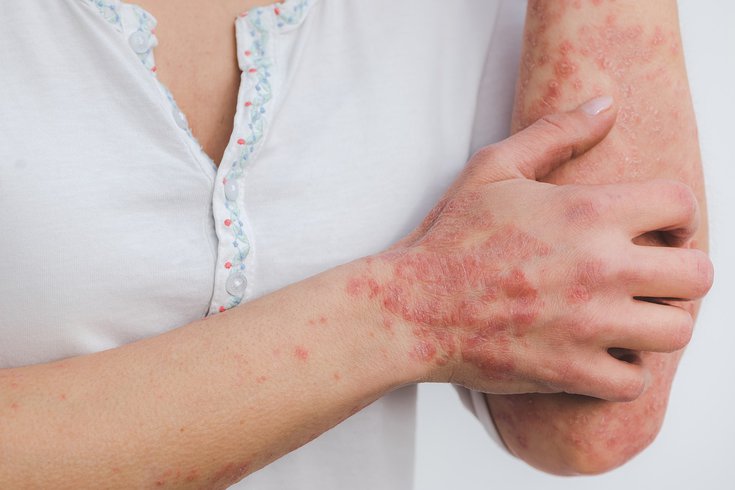
June 23, 2021
 Eszter Miller/Pixabay
Eszter Miller/Pixabay
Psoriasis prompts skin cells to rapidly multiply, causing a buildup of lesions on certain skin surfaces. Many cases are mild, but severe cases can lead to permanent disfigurement and joint disease.
Imbalances in the gut's microbiome – the microorganisms in the gastrointestinal tract – caused by a high sugar and fat diet may heighten the symptoms of inflammatory skin diseases such as psoriasis, a new study suggests.
The researchers say that eating a more balanced diet could help restore the gut's health and reduce skin inflammation.
"Earlier studies have shown that the Western diet, characterized by its high sugar and fat content, can lead to significant skin inflammation and psoriasis flares," said Sam T. Hwang, professor and chair of dermatology at UC Davis Health.
"Despite having powerful anti-inflammatory drugs for the skin condition, our study indicates that simple changes in diet may also have significant effects on psoriasis."
Every person's microbiome is different and consists of both beneficial and potentially harmful microorganisms. When you are healthy there is a balance of both types of microbes. Any disruption in that balance though could make you more vulnerable to disease, according to Harvard Health.
Psoriasis is a common skin condition that causes raised red, scaly patches of skin that can feel itchy or painful. But if that inflammation can't be kept in check, it can affect a person's entire body.
Psoriasis prompts skin cells to rapidly multiply, causing a buildup of lesions on certain skin surfaces. Many cases are mild, but severe cases can lead to permanent disfigurement and joint disease. About 30% of people with psoriasis will develop psoriatic arthritis, which causes inflammation in the joints and tendons.
Symptoms of psoriatic arthritis include morning stiffness and fatigue, swollen fingers and toes, pain in joints and changes to nails.
The condition's pathology is not really known, but studies have suggested that it is a systemic disease that can affect any part of the body in which inflammation can spread.
Psoriasis increases risk for serious health conditions like diabetes, obesity, high blood pressure, cardiovascular disease and autoimmune diseases. It also can lead to depression.
Treatment for psoriasis generally involves topical medications like corticosteroids, retinoids and vitamin D analogues to oral and injectable medications. In more severe cases, biologic drugs, narrow ultraviolet B phototherapy and photochemotherapy are used. Photochemotherapy requires patients to take light-sensitizing medicine before being exposed to UVB rays.
This new study, however, suggests that changes in diet may also help. Scientists say that food is one of the major ways to regulate gut microbiota. It is an imbalance in the types of microorganisms referred to as dysbiosis that contributes to gut inflammation.
Using a mouse model, the researchers explored whether intestinal dysbiosis affects skin and joint inflammation. They found a diet high in fat and sugar was enough to increase psoriasis-like skin inflammation.
"There is a clear link between skin inflammation and changes in the gut microbiome due to food intake," Hwang said. "The bacterial balance in the gut disrupted shortly after starting a Western diet, and worsened psoriatic skin and joint inflammation."
The good news though is that switching to a more balanced diet can reduce psoriatic symptoms. The researchers also found that antibiotics block the effects of a rich diet reducing skin and joint inflammation.
"It was quite surprising that a simple diet modification of less sugar and fat may have significant effects on psoriasis," said Zhenrui Shi, lead study author and visiting assistant researcher in the UC Davis Department of Dermatology.
"These findings reveal that patients with psoriatic skin and joint disease should consider changing to a healthier dietary pattern."
The study was was published in the Journal of Investigative Dermatology.